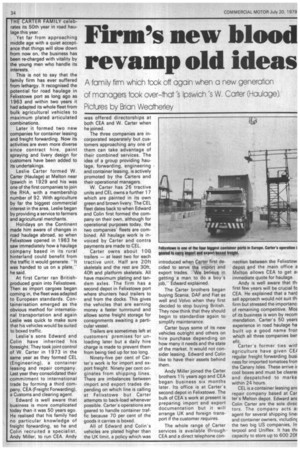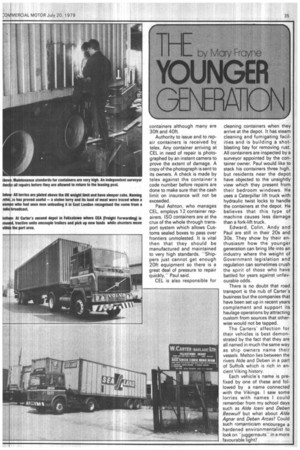Firm's new blood revamp old ideas
Page 36

Page 37

If you've noticed an error in this article please click here to report it so we can fix it.
A family firrn which took off again when a new generation of managers took over-thcr "s ipswich 's W. Carter (Haulage). Pictures by Brian Weatheriey
THE CARTER FAMILY celebrates its 50th year in road haulage this year.
Yet far from approaching middle age with a quiet accept ance that things will slow down from now on, the business has been re-charged with vitality by the young men who handle its interests.
This is not to say that the family firm has ever suffered from lethargy. It recognised the potential for road haulage in Felixstowe port as long ago as 1963 and within two years it had adapted its whole fleet from bulk agricultural vehicles to maximum plated articulated combinations.
Later it formed two new companies for container leasing and freight forwarding. Now its activities are even more diverse since contract hire, paint spraying and livery design for customers have been added to its undertakings.
Leslie Carter formed W. Carter (Haulage) at Melton near Ipswich in 1 929 and his was one of the first companies to join the RHA, with a membership number of 92. With agriculture by far the biggest commercial interest in the area, Leslie began by providing a service to farmers and agricultural merchants.
Holidays on the Continent made him aware of changes in road haulage abroad, so when Felixstowe opened in 1963 he saw immediately how a haulage company based in its rural hinterland could benefit from the traffic it would generate. "It was handed to us on a plate,he said.
At first Carter ran Britishproduced grain into Felixstowe. Then as import cargoes began coming in, the fleet was adapted to European standards. Containerisation emerged as the obvious method for international transportation and again Leslie was quick to make sure that his vehicles would be suited to boxed traffic.
Leslie's sons Edward and Colin have inherited his foresight. They took joint control of W. Carter in 1973 in the same year as they formed CEL (Engineering), a container leasing and repair company. Last year they consolidated their commitment to international trade by forming a third company, CEA (Freight Forwarding), a Customs and clearing agent.
Edward is well aware that business is more complicated today than it was 50 years ago. He realised that his family had no particular knowledge of freight forwarding, so he and Colin recruited a specialist, Andy Miller, to run CEA. Andy was offered directorships at both CEA and W. Carter when he joined.
The three companies are incorporated separately but customers approaching any one of them can take advantage of their combined services. The idea of a group providing haulage, forwarding, engineering and container leasing, is actively promoted by the Carters and their operational managers.
W. Carter has 26 tractive units and CEL owns a further 17 which are painted in its own green and brown livery. The CEL fleet dates back to when Edward and Colin first formed the company on their own, although for operational purposes today, the two companies' fleets are combined. All haulage work is invoiced by Carter and contra payments are made to CEL.
Carter owns about 100 trailers — at least two for each tractive unit. Half are 20ft skeletals and the rest are 30ft, 40ft and platform skeletals. All have maximum plating and tandem axles. The firm has a second depot in Felixstowe port where shunters haul trailers to and from the docks. This gives the vehicles that are earning money a faster turnround and allows some freight storage for consignments awaiting a particular vessel.
Trailers are sometimes left at customers premises for unloading later but a daily hire charge is made to prevent them from being tied up for too long.
Ninety-five per cent of Carter's work is for import and export freight. Ninety per cent originates from shipping lines. There are imbalances between import and export trades depending on which line is calling at Felixstowe but Carter attempts to back-load whenever possible. Carter's operations are geared to handle container traffic because 70 per cent of the goods it carries is boxed.
All of Edward and Colin's vehicles are plated higher than the UK limit, a policy which was
introduced when Carter first decided to serve the import and export trades. -We believe in getting a man to do a boy's job,Edward explained.
The Carter brothers began buying Scania, DAF and Fiat as well and Volvo when they first decided to stop buying British. They now think that they should begin to standardise again to simplify maintenance.
Carter buys some of its new vehicles outright and others on hire purchase depending on how many it needs and the state of the market. It would not consider leasing. Edward and Colin like to have their assets behind them.
Andy Miller joined the Carter brothers 11/2 years ago and CEA began business six months later. Its office is at Carter's second depot in Felixstowe. The bulk of CEA's work at present is preparing import and export documentation but it will arrange UK and foreign transport if the customer requires.
The whole range of Carter services is available through. CEA and a direct telephone con nection between the Felixstow depot and the main office a Melton allows CEA to get al immediate quote for haulage.
Andy is well aware that th, first few years will be crucial fo CEA. He explained that a hard sell approach would not suit till firm but stressed the importano of remaining competitive. Mos of its business is won by recorn mendation. Carter's 50 years experience in road haulage ha built up a good name fror which all three companies ber efit.
Carter's former ties witl agriculture have given CE/ regular freight forwarding busi ness for imported tomatoes fron the Canary Isles. These arrive ir cool boxes and must be clearet and despatched to marke within 24 hours.
CEL is a container leasing an repair company based at Car ter 's Melton depot. Edward an( Colin Carter are the sole direc tors. The company acts a: agent for several shipping line; and container owners, includinc the two big US companies, In terpool and Uniflex. It has th( capacity to store up to 600 20f containers although many are 30ft and 40ft.
Authority to issue and to repair containers is received by telex. Any container arriving at CEL in need of repair is photographed by an instant camera to prove the extent of damage. A copy of the photograph is sent to its owners. A check is made by telex against the container's code number before repairs are done to make sure that the cash limit on insurance will not be exceeded.
Paul Ashton, who manages CEL, employs 12 container repairers. ISO containers are at the crux of the whole through transport system which allows Customs sealed boxes to pass over frontiers unmolested. It is vital then that they should be manufactured and maintained to very high standards. "Shippers just cannot get enough 20ft equipment so there is a great deal of pressure to repair quickly," Paul said.
CEL is also responsible for cleaning containers when they arrive at the depot. It has steam cleaning and fumigating facil ities and is building a shotblasting bay for removing rust.
All containers are inspected by a surveyor appointed by the container owner. Paul would like to stack his containers three high, but residents near the depot have objected to the unsightly view which they present from their bedroom windows. He uses a Caterpillar lift truck with hydraulic twist locks to handle the containers at the depot. He believes that this type of machine causes less damage than a fork-lift truck.
Edward, Cohn, Andy and Paul are still in their 20s and 30s. They show by their enthusiasm how the younger generation can bring life into an industry where the weight of Government legislation and regulation can sometimes crush the spirit of those who have battled for years against unfavourable odds.
There is no doubt that road transport is the nub of Carter's business but the companies that have been set up in recent years complement and support its haulage operations by attracting custom from sources that otherwise would not be tapped.
The Carters affection for their vehicles is best demonstrated by the fact that they are all named in much the same way as ship owners name their vessels. Melton lies between the rivers Aide and Deben in a part of Suffolk which is rich in ancient Viking history.
Each vehicle's name is prefixed by one of these and followed by a name connected with the Vikings. I saw some lorries with names I could remember from my school days such as Aide lceni and Deben Beowulf but what about Aide Agnar and Deben Arcas? Could such romanticism encourage a hardened environmentalist to look on "juggernautsin a more favourable light?




















































































































